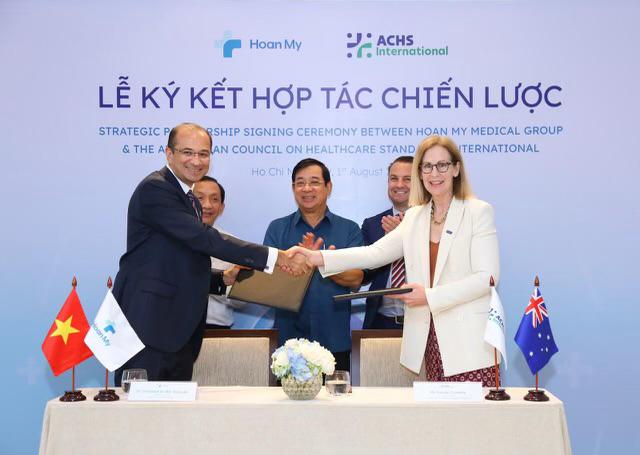Australian accreditation signals top-quality healthcare in Asia and the Middle East
Australia is well regarded for its high-quality healthcare. The Australian Council on Healthcare Standards International (ACHSI) is helping hospitals and healthcare providers in Asia Pacific, the Middle East and North Africa to achieve the similar high standards for which Australia is renowned.
ACHSI is a subsidiary of the Australian Council on Healthcare Standards (ACHS), Australia’s largest and most experienced hospital and healthcare accreditation provider. ACHSI was founded in 2005 when healthcare providers worldwide started turning to ACHS to share Australian expertise and best practice. Today, ACHSI is active in 25 countries and has 1,700 members.
Ensuring high-quality healthcare worldwide
Accreditation is based on ACHSI’s own EQuIP standards, which were rigorously developed by ACHS and accredited by the International Society for Quality in Healthcare (ISQua) External Evaluation Association (IEEA). They incorporate core principles related to patient centredness, continuous quality improvement, and outcomes.
ACHSI offers healthcare organisations a personalised opportunity to achieve across a continuum of quality improvement. The Foundation and Recognition assessment phases are aimed at organisations that are starting out on their quality and safety journey. ACHSI audits their systems and processes, then supports them to implement changes. This is the first step towards accreditation.
The Accreditation program involves assessing organisations against ACHSI standards for their type of facility. To maintain accreditation, organisations must demonstrate continuous improvement and adherence to ACHSI standards. Healthcare organisations have the opportunity to demonstrate excellence beyond accreditation through an advanced module for providers with patient-centred systems and processes.
‘Our accreditation model offers more service and more support for members,’ says Louise Cuskelly, Executive Director, ACHS International. ‘We have a strong focus on quality improvement and learning which is valued by our members. Because of this, healthcare providers are increasingly turning to ACHSI as they value our supportive approach. We are seeing growth in all the regions we work in.’
Members can benchmark their performance using ACHSI’s METRIK data measurement and analytics system. The system is underpinned by one of the world’s largest healthcare databases, comprising clinical data gathered over ACHS’ 50 years of operation. ACHSI also offers education, training and consulting services.
The power of Australian accreditation
Healthcare providers with international accreditation have a competitive advantage, says Cuskelly.
‘It gives patients a high level of assurance that the provider meets exceptionally high standards of care, safety and governance,’ she says. ‘This makes a difference in places like Bali that attract large numbers of international tourists, or for providers in the medical tourism market.’
The process of accreditation also helps healthcare providers to improve operations, reducing risk and mitigating liability. Some private healthcare providers also seek international accreditation to access public funding, qualify for insurance or benefit from tax incentives.
‘Accreditation to Australian standards is a prestigious achievement because we have a world-class health system,’ says Cuskelly. ‘We’re ranked third in the world for our healthcare system and first for healthcare outcomes.’ (Source: The Commonwealth Fund, Mirror, Mirror 2021, August 2021).

Louise Cuskelly (right) at the official signing ceremony between Hoan My Medical Corporation and ACHSI.
Austrade support around the world
ACHSI is active across the Asia-Pacific region, the Middle East and North Africa. It has offices in Australia, the Middle East and Asia Pacific. ACHSI typically partners with an Austrade business development manager in-country, who assists with customer and partner introductions, market intelligence and insights.
‘The introductions have been very helpful in building our profile and connecting us with local hospitals and healthcare organisations,’ says Cuskelly. ‘Austrade has also attended client meetings with us. This is valuable because clients appreciate the input of an Australian government agency.’
Assistance across the Asia Pacific
Austrade has provided ACHSI with insights, advice and introductions across the Asia-Pacific region. In Indonesia, ACHSI has accredited two major hospitals in Jakarta – RSU Bunda Jakarta and RSIA Bunda Jakarta – and is working with Bali Mandara General Hospital.
Austrade has introduced ACHSI to PERSI (the Indonesia Hospitals Association) and a private hospital group focused on medical tourism. Austrade is also organising meetings between ACHSI and Indonesia’s Ministry of Health to have ACHSI recognised as a preferred provider.
In Vietnam, Austrade was present when ACHSI signed a partnership with Hoan My Medical Group, one of the largest private healthcare groups in the country. Austrade has also introduced ACHSI to several public and private hospitals in Vietnam.
Austrade is supporting ACHSI in Hong Kong, India, Macau, Malaysia and the Philippines.
Middle East and North Africa
Austrade has provided introductions and attended trade shows and official signing ceremonies to support ACSHI’s expansion across the Middle East and North Africa. ACHSI has agreements with numerous large private and public healthcare groups, including Mouwasat Medical Services Company, the second largest private hospital group in Saudi Arabia; Saudi German Health, the third largest private hospital group in Saudi Arabia; and Saudi German Egypt, to name a few.
‘Our mission is to make healthcare safer, kinder and more reliable,’ says Cuskelly. ‘We want to help ensure healthcare is safe, equitable and continues to improve across the world.’
Go further, faster with Austrade
Austrade’s Go Global Toolkit helps you learn the export basics, find the right markets and understand market requirements.